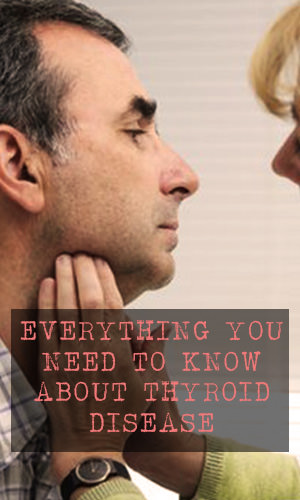
Everything You Need To Know About Thyroid Disease

Posted on 15 Aug, 2022

Studies estimate that disease of the thyroid gland is more common than diabetes or heart disease and often goes misdiagnosed or undetected. As many as 30 million Americans could be suffering thyroid dysfunction. This small gland at the base of your neck controls functions throughout the entire body, including regulating other hormones, energy levels and metabolism. It is often referred to as the metronome of life.
The master of many other hormones, thyroid dysfunction can wreak havoc, creating uncomfortable symptoms if hormone levels remain out of range. Understanding common symptoms of thyroid issues and when to seek medical advice could save your health. Read on for more information on symptoms to look out for as well as foods and lifestyle factors that support optimal thyroid function.
 1. Symptoms That Indicate A Problem
1. Symptoms That Indicate A Problem
Symptoms associated with thyroid disease are often caused by low hormone levels, also referred to as hypothyroid, which include weight gain or inability to lose weight, sensitivity to cold, weakness or fatigue, depression, pallor, constipation, poor memory, dry skin and hair and brittle nails.
Signs of the less common condition overactive thyroid (hyperthyroid) include unintended weight loss, rapid heartbeat, high blood pressure, anxiety or irritability, trembling, insomnia, feeling hot or sweating more than usual and muscle weakness. Other potential thyroid symptoms include pain at the base of the neck or throat and swelling or a lump under the Adam’s apple area.
Any pain or swelling is reason to seek medical advice right away. Keep in mind that many of these symptom groups can mimic other diseases, so it’s important to discuss the possibility of thyroid disease with your doctor. They will likely need to do some blood tests for more information.
 2. Low Thyroid Activity: Hypothyroid
2. Low Thyroid Activity: Hypothyroid
Low thyroid activity is also called hypothyroidism and is commonly caused by an autoimmune disease called Hashimoto’s disease, a problem in which the body attacks its own thyroid tissue causing it to not produce the hormone levels for optimal health. This disease is more common in women, especially those with autoimmune disease in their family.
According to a study presented in the British Medical Bulletin, because lack of iodine is uncommon in the United States, the majority of cases in these areas are related to autoimmune disorders rather than a mineral deficiency. If you have symptoms of low thyroid, your doctor can perform some tests to see if you may have Hashimoto’s disease or other forms of hypothyroid. Elevated levels of TSH hormone are used to diagnose hypothyroid or another condition called “subclinical hypothyroid,” which the European Thyroid Journal describes as increased TSH hormone with normal levels of T3 and T4 hormones.
 3. Overactive Thyroid: Hyperthyroid
3. Overactive Thyroid: Hyperthyroid
Overactive thyroid is also referred to as hyperthyroidism and is less common than low thyroid dysfunction. It’s often caused by an autoimmune condition called Graves’ disease, which causes the body to produce too much T4. Again, this is more common in women than men, and symptoms will present with unintended weight loss, rapid heartbeat or tremors, high blood pressure, anxiety or irritability and trouble sleeping.
If these types of symptoms present themselves, head to the doctor to get a blood test to assess thyroid function. Thyroid disease can often be treated with a daily medication: Your doctor can discuss options based on your unique needs.
 4. Thyroid Cancer and Goiter
4. Thyroid Cancer and Goiter
Pain in the neck or throat, swelling or a hoarse voice are reasons to get your thyroid checked out. Cancer can present itself through nodules, though the American Cancer Society cites that the majority of thyroid nodules are benign or noncancerous. Thyroid cancer is the fifth most common cancer in women, and typical treatments include surgery and radioactive iodine. Thyroid cancer is a type of cancer that is diagnosed at a younger age compared with other types -- two-thirds of all cases are diagnosed in people less than 55 years old.
A goiter, though uncommon in the United States, is caused by lack of the mineral iodine and causes a large, swollen lump at the base of the throat. With a goiter, the thyroid gland enlarges as it searches for iodine. Any sign of swelling or pain in the thyroid area should be assessed immediately.
 5. Thyroid Screening
5. Thyroid Screening
If you seek medical attention for your thyroid, you will hear terms like “T3,” “T4” or “TSH,” but what do they mean? T3 stands for triiodothyronine and T4 stands for thyroxine. T4 is made from T3, so it’s important to check both levels. The thyroid gland and the pituitary gland in the brain communicate constantly, and the pituitary tells the thyroid the correct hormone levels to pump out. This message is sent via TSH (thyroid stimulating hormone), so this is another level that will likely be checked. TSH level is used to diagnose hypothyroid because it will be elevated with this condition.
The ideal balance between T3, T4 and TSH will create harmony in the body, but high or low levels can indicate a problem with disease, medications or thyroid hormone damage. If there are any suspected problems with thyroid nodules, an ultrasound may be ordered.
 6. Thyroid and Weight
6. Thyroid and Weight
Studies have shown a correlation between increased body weight and decreased thyroid function. In a large study in the BioMed Central Endocrine Disorder Journal, elevated TSH hormone levels were strongly associated with metabolic syndrome, a cluster of symptoms associated with developing cardiovascular disease and Type 2 diabetes. Further, a higher waist circumference was associated in the same study with hypothyroid, or low thyroid function. In the PLOS ONE study, some cases with TSH in the normal range showed an incremental increase in weight with each one-unit increase in TSH hormone. This means as TSH levels goes up, weight goes up along with it.
While there is research showing a link between hypothyroid and increased weight and belly fat, many people falsely associate struggles with weight as associated with thyroid dysfunction. Weight management can be difficult and multifactorial, so definitely discuss this with your doctor. But remember: Thyroid issues are not the only reason for being overweight or inability to lose weight.
[Related: 28 Eating Secrets to Help You Lose Weight (and Save Money Too!)]
 7. When To Seek Help
7. When To Seek Help
If you believe you may have a thyroid problem, bring it up as part of the discussion next time you see your doctor. Clusters of symptoms of hypothyroid or hyperthyroid should definitely be addressed. For example, constantly feeling cold, struggling with being overweight, dry skin, brittle nails, fatigue or depression could indicate an underactive thyroid gland.
Conversely, rapid heartbeat, feeling hot or increased sweating, trembling or weight loss could indicate an overactive thyroid. If you notice any swelling, pain or a lump at the base of your neck or throat, you should go in immediately to seek medical attention. A doctor will assess thyroid function with some simple blood tests and could suggest an ultrasound or other monitoring test to check this important gland and rule out thyroid disease. Keep in mind that most nodules are not cancerous.
 8. Foods That Help
8. Foods That Help
Iodine is the main nutrient associated with thyroid support because the body uses it to make T3 and T4 hormones. Foods high in iodine include ocean fish or other seafood, seaweed or sea vegetables, dairy and iodized salt. For the most natural source of iodine, try consuming food sources instead of taking supplements. Selenium and zinc are other important nutrients for the thyroid. Look for these in seafood, nuts and seeds -- especially Brazil nuts.
A study in the European Journal of Endocrinology found that low vitamin D and selenium levels may increase the risk of developing autoimmune thyroid disease. Ask your doctor to check your vitamin D level because vitamin D is necessary for the body to create thyroid hormones T3 and to regulate TSH. The thyroid gland contains more selenium per gram than found in any other organ in the body, and even slightly low levels have been associated with autoimmune disease of the thyroid.
 9. Foods That May Hurt
9. Foods That May Hurt
Some foods, at high intake levels, can have negative effects on the thyroid gland. Cruciferous vegetables like broccoli, cauliflower, Brussels sprouts and cabbage can suppress the thyroid by raising TSH levels and have even been linked to increased rates in thyroid cancer when combined with low iodine intake. Keep in mind that studies that show negative results from cruciferous vegetables containing “goitrogen” compounds, which may enlarge the thyroid, were seen with higher-than-typical consumptions.
A goitrogen is a compound that suppresses the thyroid by interfering with iodine, which could cause a goiter or swollen thyroid. This is not a reason to avoid these healthy foods in normal daily quantities, and cooking can reduce negative effects on the thyroid. Soy has also been linked to hypothyroid, with one small study in the Journal of Clinical Endocrinology and Metabolism showing that intake at the level of a common vegetarian diet may push subclinical hypothyroid patients into overt hypothyroidism.
Plant-based nutrition expert Carolyn Tampe M.S., RD, LDN, CDE, states that “studies have not supported that soy negatively affects the thyroid in healthy individuals with adequate iodine intake and normal thyroid function.” She suggests consuming soy foods as a part of a healthy, balanced diet.
 10. Other Healthy Thyroid Factors
10. Other Healthy Thyroid Factors
Addressing lifestyle factors is an important part of assessing thyroid health because this gland governs so many functions in the body. Kelly Morrow, M.S., RD, believes that “concepts such as flow and movement (mentally and physically), fear and tension can interfere with thyroid function and regulation.” Studies linking depression to decreased thyroid function are well documented.
[Related: How Stress Can Make You Sick]
A review in the Journal of Thyroid Research states common abnormalities seen include elevated T4, low T3 and a lowered bodily response to TSH hormone. This study lists classic psychological symptoms associated with thyroid dysfunction as anxiety, irritability, emotional lability, impairment in concentration and dysphoria, or a generalized state of unease. Other lifestyle factors are also linked to thyroid problems -- smoking has been linked to increased risk for Graves’ disease, or hyperthyroidism. Because the thyroid governs so many functions in the body, it is important to consider aspects of physical and psychological health linked to this gland.
What Do YOU Think?
What is your experience with thyroid health? Have you or anyone that you know experienced issues with thyroid disease? Are there other tips for thyroid health that you think we should have included? Let us know in the comments!
Books On Thyroid We Highly Recommend

by Datis Kharrazian

by Sarah Lentz

by Linda Murray

by Anthony William
 How to Breathe For Every Type Of Exercise
How to Breathe For Every Type Of Exercise How To Use The Elliptical For Fat Loss
How To Use The Elliptical For Fat Loss Isometrics: The Secret to Gaining Strength - Without Moving a Muscle
Isometrics: The Secret to Gaining Strength - Without Moving a Muscle How to Motivate Yourself When You Feel Lazy
How to Motivate Yourself When You Feel Lazy










